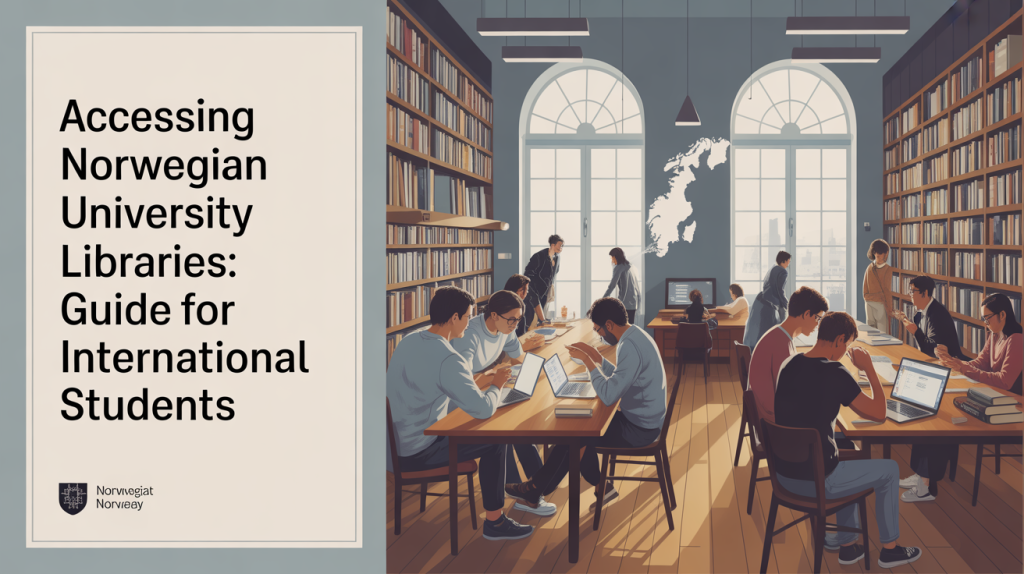Accessing Norwegian University Libraries: A Comprehensive Guide for International Students and Recruitment Professionals
Why Access to Norwegian University Libraries Matters
Norway’s higher education system is known for its quality and research excellence, backed by substantial investment in academic infrastructure, including its libraries. University libraries in Norway serve as vital hubs for learning and research, providing access to a vast range of scholarly materials, study environments, and expert support.
For international students, familiarizing themselves with library resources enhances their ability to succeed academically, while recruiters and HR professionals benefit from understanding these facilities to manage expectations and support processes related to international student onboarding and retention.
On-Campus and Local Access to Norwegian University Libraries
Who Can Access
- Students and Academic Staff: Full borrowing, printing, and group study room access.
- General Public: Many libraries allow non-affiliated users to visit, read on-site, and sometimes borrow materials through special arrangements.
Key Features of On-Campus Libraries
- Study Spaces: Individual desks, quiet zones, and group study rooms cater to diverse study preferences.
- Print and Copy Services: Printers and scanners are widely available to support coursework and research.
- Course Literature Borrowing: Students can borrow textbooks and course-related materials according to institutional borrowing policies.
- Special Collections: Institutions like the University of Oslo and the University of Bergen curate unique scholarly archives for in-depth research.
Access and Usage Tips
- Registration: Students typically receive library access credentials during enrollment. External visitors may need to register at the library.
- Opening Hours: Vary by institution; students are advised to check the individual library’s schedule.
- Facilities Use: Group study rooms often require prior booking, especially during peak academic periods.
Online Resources and Remote Access for International Students
Remote Access Capabilities
- Digital Collections: Include e-books, academic journals, theses, and databases.
- Authentication: Access requires institutional login credentials, commonly through a FEIDE account—a nationwide digital identity system used by Norwegian educational institutions.
- Availability: Many resources are accessible 24/7 from anywhere in the world, facilitating flexible study schedules.
Usage Policies and Restrictions
- Some digital materials are protected by copyright and may have restrictions on download, copying, or printing.
- Access to certain proprietary databases or journals may be limited to on-campus or authorized users.
- Students should consult their university’s library portal for specific access instructions and technical support.
National Library of Norway: Navigating Digital Access
Eligibility and Access Procedures
- Authorized Users: Students and staff affiliated with Norwegian academic institutions can log in using FEIDE credentials or the national ID system ID-porten.
- Access Changes from 2025: Starting 1 February 2025, recent textbooks and professional literature published within the last 20 years will only be digitally accessible to scientific employees at universities and university colleges. Students will not have digital access to these materials.
- Application Process: After logging in, users complete an online application within the platform, which is processed during library hours. Upon approval, access is granted for an 8-hour session.
- Session Management: Sessions expire after 8 hours or if inactive for 2 hours, requiring reapplication.
Key Limitations and Guidelines
- Streaming-Only Access: Digital content is streamed; downloading or redistribution is prohibited.
- Printing Restrictions: Printing from the digital platform is not permitted.
- Simultaneous Users: For certain books, only two user sessions are allowed concurrently for students, necessitating reattempts if materials are “checked out.”
Research Centers and Special Collections at Norwegian Universities
Access and Support
- Institution-Specific Policies: Access to special collections and archives varies; students and researchers should consult their host institution’s library directly.
- Staff Assistance: Librarians and academic staff provide support for locating literature, using specialized databases, and navigating access protocols.
Summary Table: Overview of Norwegian University Library Access
| Library Type | Access Eligibility | Access Method | Special Notes |
|---|---|---|---|
| On-campus university libraries | Students, staff, public | Physical visit or registration | Study rooms, borrowing, printing available |
| University online resources | Students, staff | Institutional login (FEIDE) | Off-campus access to e-books, journals, databases |
| National Library of Norway (digital) | Students, staff, public | FEIDE/ID-porten login + application | 8-hour streaming sessions; recent materials restricted to scientific staff |
Conclusion: Empowering Students Through Library Access Knowledge
Accessing Norwegian university libraries, whether on-campus or remotely, is a fundamental part of the academic experience. Understanding the access policies, digital resources, and research facilities available enhances student preparedness and academic success.
For international education professionals, equipping students with this knowledge fosters better retention and satisfaction. Leveraging the insights provided here will enable you to offer precise, actionable guidance.
Take the Next Step with Study in Norway
Expand your understanding of academic resources and services available in Norway.

